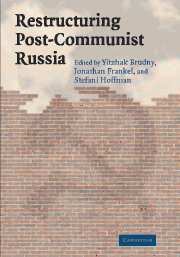Book contents
- Frontmatter
- Contents
- Contributors
- Preface
- Restructuring Post-Communist Russia
- INTRODUCTION
- THE COMPARATIVE DIMENSION
- RUSSIA IN FREE FALL? KEY CHALLENGES
- The Russian transition to the market: Success or failure?
- Potholes on the road to a flourishing Russia: Structural problems in the second decade
- The search for a national identity in the Russia of Yeltsin and Putin
- THE RUSSIAN POLITICAL SYSTEM: TOWARD STABILIZATION?
- Index
The Russian transition to the market: Success or failure?
Published online by Cambridge University Press: 25 July 2009
- Frontmatter
- Contents
- Contributors
- Preface
- Restructuring Post-Communist Russia
- INTRODUCTION
- THE COMPARATIVE DIMENSION
- RUSSIA IN FREE FALL? KEY CHALLENGES
- The Russian transition to the market: Success or failure?
- Potholes on the road to a flourishing Russia: Structural problems in the second decade
- The search for a national identity in the Russia of Yeltsin and Putin
- THE RUSSIAN POLITICAL SYSTEM: TOWARD STABILIZATION?
- Index
Summary
The difficulties in the transition from communism to a market economy in Russia should not have come as a surprise. Many assumed that, given the opportunity, the Russians, like the Chinese and the Poles before them, would jump at the chance to switch to a competitive economy, and that, for their part, like crocuses in the spring, the institutions suited to the market economy would quickly reemerge from the frozen soil.
In retrospect, such hopes ignored how profoundly 70 years of communism battered not only those institutions but also the cultural behavior that gave rise to these institutions in the first place. After all, hardly anyone anticipated how quickly communism would collapse. Because such disintegration seemed so unlikely, almost no one, either inside or outside the USSR, found the time to examine the challenge that would come with such a transition. How badly suited Russia was for the transition is reflected in the near collapse of the economy. From 1990 to 1999, the gross domestic product (GDP) – at least according to official figures – shrank to between 50 to 60 percent of its pre-reform size (see Table 1). This was sharper than anything experienced by the United States during the Great Depression.
If for no other reason, the fact that Russia's economy was so completely dedicated to the Cold War meant that any end to that confrontation, even a gradual one, would make both adjustments and civilian conversion difficult.
- Type
- Chapter
- Information
- Restructuring Post-Communist Russia , pp. 119 - 135Publisher: Cambridge University PressPrint publication year: 2004

